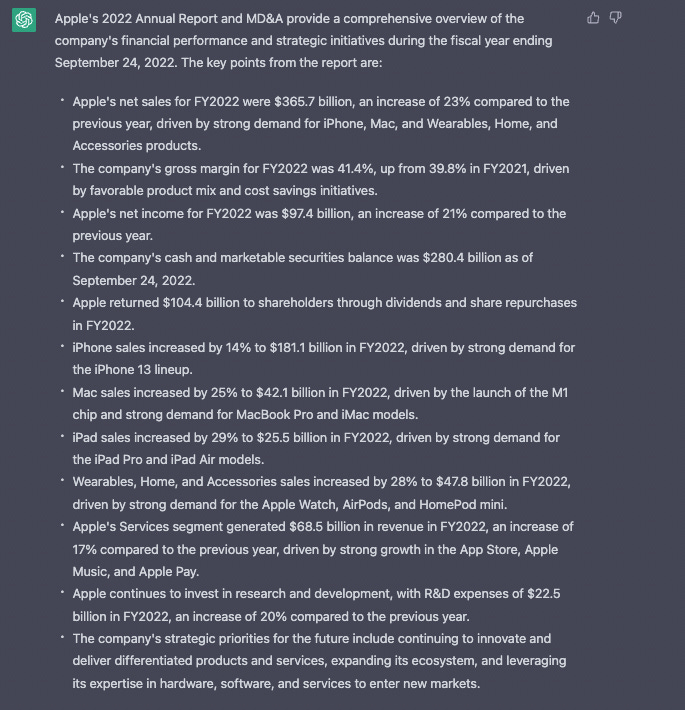- Lemonade Stand Finance
- Posts
- Effortlessly Analyze Financial Reports with ChatGPT: The Ultimate Tool for Investors
Effortlessly Analyze Financial Reports with ChatGPT: The Ultimate Tool for Investors
Unlocking the Secrets of Financial Statements for Clearer Insights
In this article you will find out how to use ChatGPT to analyze financial documents such as annual reports, and ultimately make better investment decisions. Read below to see:
Introduction
How to structure prompts to get a proper analysis of the Company/report
Example prompt & response (Apple 2022 annual report)
A list of follow up questions to ask to get information about the Company’s financial strength & outlook, including
Blance sheet
Income statement
Cash flow statement
Growth & competitive position
Key risks
Conclusion
Introduction
ChatGPT is a powerful tool for investors, but many people don't know how to properly use it.
The best use, by far, is that you can get it to summarize long and often complex documents such as annual reports, and then ask follow up questions so you don't need to read though 100s of pages to understand a business.
Start by asking for a summary of the document. You will get a summary of key income statement metrics, segmented sales, growth over previous periods, the sources of that growth, and any other key info emphasized in the document.
You need to do some specifics when structuring the prompt. If you just copy/paste the report and ask for a summary, it will not work. For example, I did a simple copy/paste with Apple 2022 report & the bot thought it was a medical devices company, and the information provided was inaccurate.
Prompts
The prompt needs to include the following specifics:
Key word: Summarize
Key word: key points
Key word: [Name of Company]
Key word: [Name of report]
Insert link
I.e. Summarize the key points in Apple's 2022 annual report and MD&A: https://s2.q4cdn.com/470004039/files/doc_financials/2022/q4/_10-K-2022-(As-Filed).pdf
Here is what it came up with when I tried with Apple:

You can see it gives you a good chunk of information. Enough to allow you to understand the general strength and trend of the business. There is still a lot missing, however, so it is important to ask follow up questions.
These follow up questions are where this tool can provide you with the most value. It will save you time and give you the exact information you are looking for. You can ask whatever you want but I have provided a list of questions I like to ask below:
Questions
Balance Sheet
Analyze the balance sheet strength.
What is their credit rating?
Has the credit rating increased/decreased recently?
Do they have any off-balance sheet liabilities?
How are AR, AP, Inventory, and the cash conversion cycle trending?
Were there any significant write downs in the year?
Do they have a significant amount of goodwill?
Income Statement
Use the DuPont model to analyze ROE.
How has operating income been trending? What was the driver of this increase/decrease?
Are there any unusual items in earnings?
How have gross, operating, and net margins been trending? What was the driver of this increase/decrease?
Cash Flow Statement
How has operating cash flow been trending? What was the cause of the increase/decrease?
What were the main uses of cash flow from investing activities?
Did the Company raise any capital or pay down any debt this year?
Did the Company return any capital to shareholders?
Did their dividend increase/decrease?
Did they increase/decrease share buybacks?
How has free cash flow been trending?
Growth & Competitive Position
How are they planning to protect their competitive advantage?
How are they planning to innovate & grow?
How are they planning to create value to shareholders?
Do they plan to return capital to shareholders in the future?
Risks
Summarize the key risks section
Conclusion
ChatGPT is a powerful tool for investors to quickly and easily understand complex financial documents such as annual reports. However, it is important to structure prompts correctly to get the best results. Asking for a summary of the document and following up with specific questions can save investors valuable time and provide them with the exact information they are looking for. By utilizing this tool effectively, investors can gain a deeper understanding of a company's financial position, competitive position, and growth prospects, ultimately helping them make more informed investment decisions.